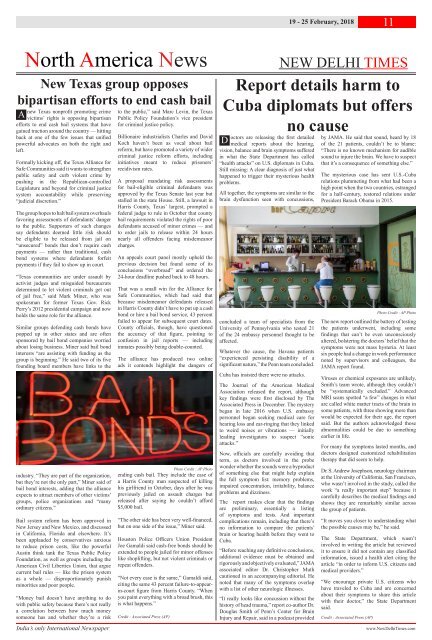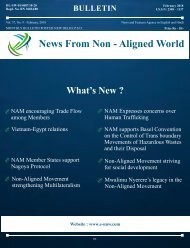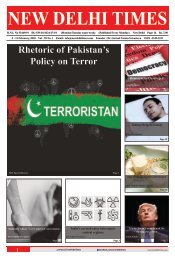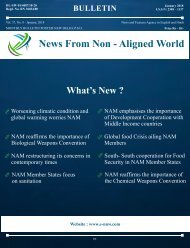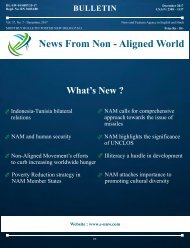19-25 February 2018 - 16 new-min
Create successful ePaper yourself
Turn your PDF publications into a flip-book with our unique Google optimized e-Paper software.
<strong>19</strong> - <strong>25</strong> <strong>February</strong>, <strong>2018</strong> 11<br />
North America News<br />
New Texas group opposes<br />
bipartisan efforts to end cash bail<br />
A<br />
<strong>new</strong> Texas nonprofit promoting crime<br />
victims’ rights is opposing bipartisan<br />
efforts to end cash bail systems that have<br />
gained traction around the country — hitting<br />
back at one of the few issues that unified<br />
powerful advocates on both the right and<br />
left.<br />
Formally kicking off, the Texas Alliance for<br />
Safe Communities said it wants to strengthen<br />
public safety and curb violent crime by<br />
pushing in the Republican-controlled<br />
Legislature and beyond for cri<strong>min</strong>al justice<br />
system accountability while preserving<br />
“judicial discretion.”<br />
The group hopes to halt bail system overhauls<br />
favoring assessments of defendants’ danger<br />
to the public. Supporters of such changes<br />
say defendants deemed little risk should<br />
be eligible to be released from jail on<br />
“unsecured” bonds that don’t require cash<br />
payments — rather than traditional, cash<br />
bond systems where defendants forfeit<br />
payments if they fail to show up in court.<br />
“Texas communities are under assault by<br />
activist judges and misguided bureaucrats<br />
deter<strong>min</strong>ed to let violent cri<strong>min</strong>als get out<br />
of jail free,” said Mark Miner, who was<br />
spokesman for former Texas Gov. Rick<br />
Perry’s 2012 presidential campaign and now<br />
holds the same role for the alliance.<br />
Similar groups defending cash bonds have<br />
popped up in other states and are often<br />
sponsored by bail bond companies worried<br />
about losing business. Miner said bail bond<br />
interests “are assisting with funding as the<br />
group is beginning.” He said two of its five<br />
founding board members have links to the<br />
industry. “They are part of the organization,<br />
but they’re not the only part,” Miner said of<br />
bail bond interests, adding that the alliance<br />
expects to attract members of other victims’<br />
groups, police organizations and “many<br />
ordinary citizens.”<br />
Bail system reform has been approved in<br />
New Jersey and New Mexico, and discussed<br />
in California, Florida and elsewhere. It’s<br />
been applauded by conservatives anxious<br />
to reduce prison costs, like the powerful<br />
Austin think tank the Texas Public Policy<br />
Foundation, as well as groups including the<br />
American Civil Liberties Union, that argue<br />
current bail rules — like the prison system<br />
as a whole — disproportionately punish<br />
<strong>min</strong>orities and poor people.<br />
“Money bail doesn’t have anything to do<br />
with public safety because there’s not really<br />
a correlation between how much money<br />
someone has and whether they’re a risk<br />
India’s only International Newspaper<br />
to the public,” said Marc Levin, the Texas<br />
Public Policy Foundation’s vice president<br />
for cri<strong>min</strong>al justice policy.<br />
Billionaire industrialists Charles and David<br />
Koch haven’t been as vocal about bail<br />
reform, but have promoted a variety of wider<br />
cri<strong>min</strong>al justice reform efforts, including<br />
initiatives meant to reduce prisoners’<br />
recidivism rates.<br />
A proposal mandating risk assessments<br />
for bail-eligible cri<strong>min</strong>al defendants was<br />
approved by the Texas Senate last year but<br />
stalled in the state House. Still, a lawsuit in<br />
Harris County, Texas’ largest, prompted a<br />
federal judge to rule in October that county<br />
bail requirements violated the rights of poor<br />
defendants accused of <strong>min</strong>or crimes — and<br />
to order jails to release within 24 hours<br />
nearly all offenders facing misdemeanor<br />
charges.<br />
An appeals court panel mostly upheld the<br />
previous decision but found some of its<br />
conclusions “overbroad” and ordered the<br />
24-hour deadline pushed back to 48 hours.<br />
That was a small win for the Alliance for<br />
Safe Communities, which had said that<br />
because misdemeanor defendants released<br />
in Harris County didn’t have to put up a cash<br />
bond or hire a bail bond service, 43 percent<br />
failed to appear for subsequent court dates.<br />
County officials, though, have questioned<br />
the accuracy of that figure, pointing to<br />
confusion in jail reports — including<br />
inmates possibly being double-counted.<br />
The alliance has produced two online<br />
ads it contends highlight the dangers of<br />
ending cash bail. They include the case of<br />
a Harris County man suspected of killing<br />
his girlfriend in October, days after he was<br />
previously jailed on assault charges but<br />
released after saying he couldn’t afford<br />
$5,000 bail.<br />
“The other side has been very well-financed,<br />
but on one side of the issue,” Miner said.<br />
Houston Police Officers Union President<br />
Joe Gamaldi said cash-free bonds should be<br />
extended to people jailed for <strong>min</strong>or offenses<br />
like shoplifting, but not violent cri<strong>min</strong>als or<br />
repeat offenders.<br />
“Not every case is the same,” Gamaldi said,<br />
citing the same 43 percent failure-to-appearin-court<br />
figure from Harris County. “When<br />
you paint everything with a broad brush, this<br />
is what happens.”<br />
Credit : Associated Press (AP)<br />
Photo Credit : AP Photo<br />
NEW DELHI TIMES<br />
Report details harm to<br />
Cuba diplomats but offers<br />
no cause<br />
D<br />
octors are releasing the first detailed<br />
medical reports about the hearing,<br />
vision, balance and brain symptoms suffered<br />
in what the State Department has called<br />
“health attacks” on U.S. diplomats in Cuba.<br />
Still missing: A clear diagnosis of just what<br />
happened to trigger their mysterious health<br />
problems.<br />
All together, the symptoms are similar to the<br />
brain dysfunction seen with concussions,<br />
concluded a team of specialists from the<br />
University of Pennsylvania who tested 21<br />
of the 24 embassy personnel thought to be<br />
affected.<br />
Whatever the cause, the Havana patients<br />
“experienced persisting disability of a<br />
significant nature,” the Penn team concluded.<br />
Cuba has insisted there were no attacks.<br />
The Journal of the American Medical<br />
Association released the report, although<br />
key findings were first disclosed by The<br />
Associated Press in December. The mystery<br />
began in late 20<strong>16</strong> when U.S. embassy<br />
personnel began seeking medical care for<br />
hearing loss and ear-ringing that they linked<br />
to weird noises or vibrations — initially<br />
leading investigators to suspect “sonic<br />
attacks.”<br />
Now, officials are carefully avoiding that<br />
term, as doctors involved in the probe<br />
wonder whether the sounds were a byproduct<br />
of something else that might help explain<br />
the full symptom list: memory problems,<br />
impaired concentration, irritability, balance<br />
problems and dizziness.<br />
The report makes clear that the findings<br />
are preli<strong>min</strong>ary, essentially a listing<br />
of symptoms and tests. And important<br />
complications remain, including that there’s<br />
no information to compare the patients’<br />
brain or hearing health before they went to<br />
Cuba.<br />
“Before reaching any definitive conclusions,<br />
additional evidence must be obtained and<br />
rigorously and objectively evaluated,” JAMA<br />
associated editor Dr. Christopher Muth<br />
cautioned in an accompanying editorial. He<br />
noted that many of the symptoms overlap<br />
with a list of other neurologic illnesses.<br />
“It really looks like concussion without the<br />
history of head trauma,” report co-author Dr.<br />
Douglas Smith of Penn’s Center for Brain<br />
Injury and Repair, said in a podcast provided<br />
by JAMA. He said that sound, heard by 18<br />
of the 21 patients, couldn’t be to blame:<br />
“There is no known mechanism for audible<br />
sound to injure the brain. We have to suspect<br />
that it’s a consequence of something else.”<br />
The mysterious case has sent U.S.-Cuba<br />
relations plummeting from what had been a<br />
high point when the two countries, estranged<br />
for a half-century, restored relations under<br />
President Barack Obama in 2015.<br />
The <strong>new</strong> report outlined the battery of testing<br />
the patients underwent, including some<br />
findings that can’t be even unconsciously<br />
altered, bolstering the doctors’ belief that the<br />
symptoms were not mass hysteria. At least<br />
six people had a change in work performance<br />
noted by supervisors and colleagues, the<br />
JAMA report found.<br />
Viruses or chemical exposures are unlikely,<br />
Smith’s team wrote, although they couldn’t<br />
be “systematically excluded.” Advanced<br />
MRI scans spotted “a few” changes in what<br />
are called white matter tracts of the brain in<br />
some patients, with three showing more than<br />
would be expected for their age, the report<br />
said. But the authors acknowledged those<br />
abnormalities could be due to something<br />
earlier in life.<br />
For many the symptoms lasted months, and<br />
doctors designed customized rehabilitation<br />
therapy that did seem to help.<br />
Dr. S. Andrew Josephson, neurology chairman<br />
at the University of California, San Francisco,<br />
who wasn’t involved in the study, called the<br />
work “a really important step” because it<br />
carefully describes the medical findings and<br />
shows they are remarkably similar across<br />
the group of patients.<br />
“It moves you closer to understanding what<br />
the possible causes may be,” he said.<br />
The State Department, which wasn’t<br />
involved in writing the article but reviewed<br />
it to ensure it did not contain any classified<br />
information, issued a health alert citing the<br />
article “in order to inform U.S. citizens and<br />
medical providers.”<br />
“We encourage private U.S. citizens who<br />
have traveled to Cuba and are concerned<br />
about their symptoms to share this article<br />
with their doctor,” the State Department<br />
said.<br />
Credit : Associated Press (AP)<br />
Photo Credit : AP Photo<br />
www.NewDelhiTimes.com


